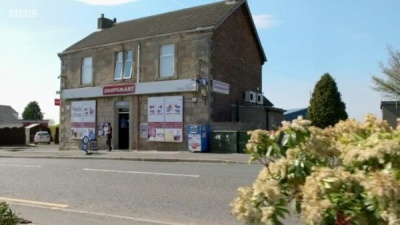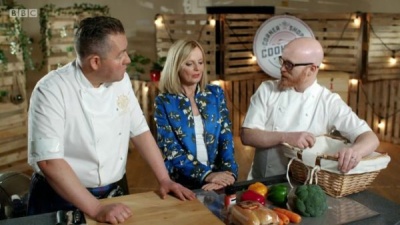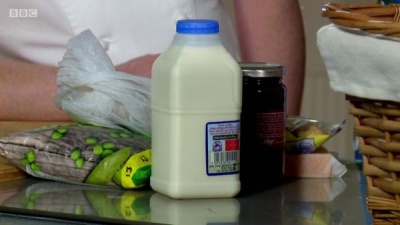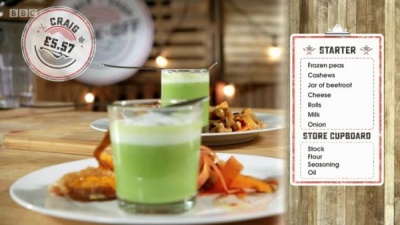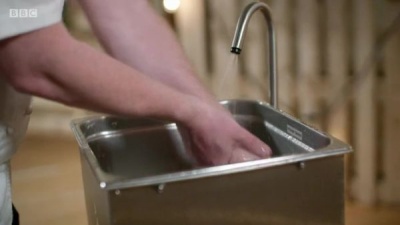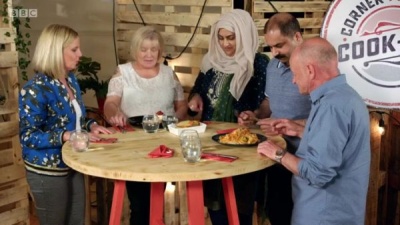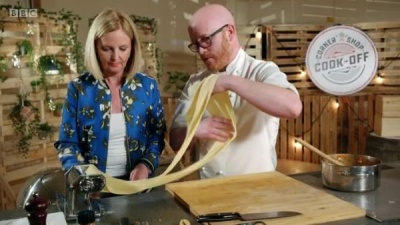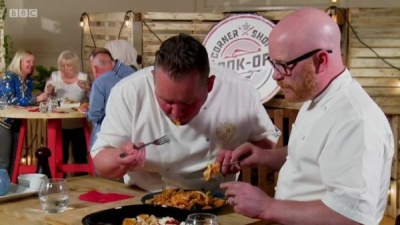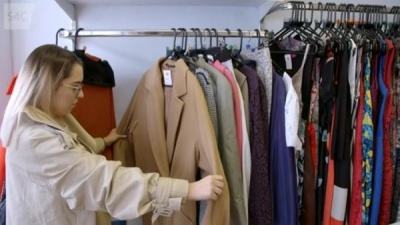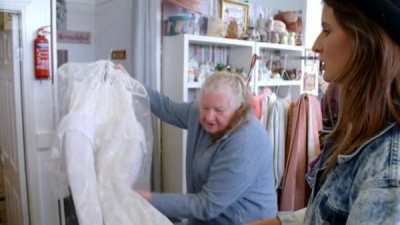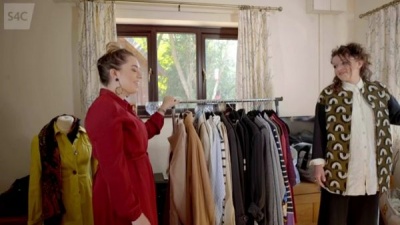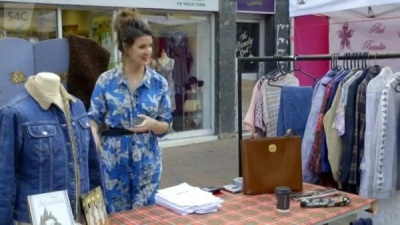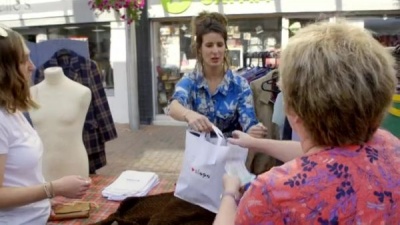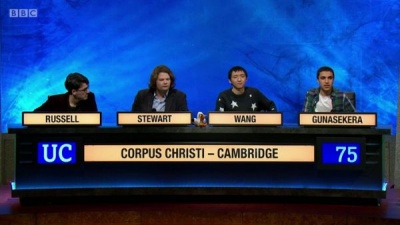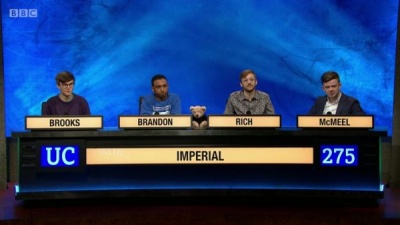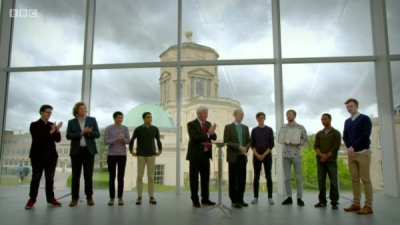Weaver's Week 2020-04-26
Last week | Weaver's Week Index | Next week
Great meals, and great clothes, could be closer than you think.
Contents |
Corner Shop Cook-Off
Mentorn Scotland for BBC Scotland, 19 February – 26 March
The idea is terribly simple. Go to your local corner shop. Spend £15 on ingredients. Make a three-course meal from those ingredients, plus the usual larder of staples like flour, oil, sugar, eggs, and stock cubes.
For our sample episode, we're in Law, where Nadeem and Fareha own Nad's Store. They're at the heart of the small community. Clare Grogan, our host, is first into the shop. She picks up some special ingredients – chickpeas, corn flakes, and fish fingers. We'll come back to these later.
Corner Shop Cook-Off features resident chef Gary Maclean, who you'll perhaps know from Masterchef The Professionals. This week, Gary's opponent is Craig Wilson, "The Kilted Chef". We meet both of these in the community hall, where they've set up a wood-panel kitchen.
One at a time, the players go to the shop, and make their selections for the starter. They've obviously got some idea of what they want to cook up, but can we guess from the ingredients?
And if you had "pea cappuccino with a nut salad", congratulations. Even though "cappuccino" in this case is a thin soup with a frothy milky top, and not a concoction involving coffee or whatever mediocrity they serve in Starbucks.
The chefs talk to each other while they're cooking: this is a competition, and there will be some gentle banter between the players. We also get some tips on how to make a quick pickle: lots of vinegar, a fair amount of sugar, and some heat.
While they're cooking, we meet the judges. Both people from the corner shop, and someone else who is active in the local community. It's Groundskeeper Derek from the Law Lawn Bowls bowls club.
Only 30 minutes to make the starter, and then it's judging time. There's a very gentle encouragement to do your own cooking at home. "Look what you can make with these few ingredients. And all from your local corner shop."
The winner gets to pick something from the mystery boxes, and first chance to go shopping. Again, the ideas are not clear – fish fingers, some chick peas, apples, potatoes – and an ice lolly? Apparently, add that to some mayonnaise to make a tangy sauce. There's also going to be some home-made pasta.
Another short time scale – 40 minutes to make the main course. More hands washed, more cooking, more banter. And we meet another guest judge: this time, it's a local cook. Four of them tuck into the mains, and the cooks sample each other's dishes.
The winner gets to pick one of the remaining mystery boxes, and the first chance to go shopping. Thank goodness the fish fingers went in the last round, and aren't for use in the dessert!
They've kept tabs on how much the cooks have spent, down to the last penny. Fifteen pounds, and not a penny more. We're aware of the stereotype of Scottish people as looking after every last penny, and to that we say pish. We're also aware that many people – particularly those who use corner shops because the supermarkets are too far away – need to look after every last penny. Food poverty is a social failure, not a personal fault.
And there's a final set of judging, with another judge – this time, a man of the cloth. A winner is declared, and the loser is lumbered with the day's washing up.
Clare Grogan hosts and narrates the show, and joins in with the banter and bonhomie throughout, and samples some of the cookery. Some of us might remember Clare as the singer from Altered Images, or the star of Gregory's Girl. Here, she's just being herself: pleasant, witty, sharp. Quite the best new cookery show host we've seen in a long time.
We might not remember the details of any particular episode of Corner Shop Cook-Off, but we will remember how we enjoyed the show. It's warm, comradely, grounded in a particular sense of place. The challenge is enough of an excuse to make the show, but it's also an excuse to explore some of the smaller communities in Scotland, to show that BBC Scotland isn't just about Glasgow and Edinburgh.
But most of all, it's gently inspirational. What can we mix up from flour, eggs, and some slightly wilted spinach?
Caru Siopa
Boom Cymru for S4C, from 30 March
Two fashionable people are given £300 to spend on clothes from charity shops (and sewing materials). They'll do the clothes up, and sell them at a big event. Whoever makes the most profit wins their money, and that of the other contestant.
For our sample episode, we're in Llanelli, where there's going to be a vintage fair in a couple of weeks. We meet Hannah and Ffion, both contestants studied fashion for a living. They know what fabrics work, what a good cut looks like, and how to make their own clothes. Each contestant takes Lara up to her bedroom, and together they poke about the wardrobe.
Before going shopping, Lara hands over a bag of tricks. A calculator and little red book, to total the purchases. There's a glue gun, and a sewing kit. And £300 in cash, to buy clothes from charity shops.
So next, we're going shopping. What's on the racks today? A coat from Marks and Sparks down to £4, a snip! A denim jacket for £30: will there be some haggling to be done? A gorgeous wedding dress: it's £40, but surely will sell. The contestants don't have to stick to women's clothes, they could choose to buy some menswear, though not this week.
After the break (it's S4C, advertisers fund the channel), Lara offers some tips of her own. How to sell clothes on the internet, in other episodes how to make running repairs like sew on a button or repair a zip. Then Lara goes to visit the contestants, look at what they've got, and see what might sell. That wedding dress could fetch a few bob...
And then we cut to the day of the vintage fair, both contestants setting out their stalls – and we mean that quite literally, being market stalls in the open air. The players meet for the first time, and begin to sell their wares.
Cue lots of pictures of people looking at the clothes, and buying the clothes, and handing over the clothes. Soon enough, we're into the closing moments of the sale. And, hey, we recognise that techno-tense music, it's been upcycled from Un Cwestiwn, the quiz for children.
Finally, the time is up, sales are done. How much did the two stalls make? Who gets the profits? Goodness, it's Ffion, experience in the industry – and not buying an expensive wedding dress that went for £20 – helped.
Lara Catrin hosts, and she's absolutely in her element. The whole show has a slightly bohemian feel, like we're back in the swinging sixties. The mood is helped by the colourful and retro typeface, and the swinging jazz music. They've thought about the whole show, the entire package, and the attention to detail makes for better viewing.
Though they don't trumpet it on screen, the show's net result is to transfer £600 from the shoppers to charities. We found Caru Siopa to be a moreish show: we were pleasantly surprised at how entertained we were throughout. And we were encouraged to think about what wonders will be waiting next time we can trawl the local charity shops.
In other news...
The University Challenge final took place. The gentlemen of Corpus Christi Cambridge took on the gentlemen of Imperial College London. Corpus Christi were represented by Alexander Russell, Will Stewart, Ian Wang, and Alex Gunasekera; Imperial's foursome was Richard Brooks, Brandon, Caleb Rich, and Conor McMeel. Neither side had lost a match on the way to the final; statistical analysis suggested that Imperial's Brandon was the best individual buzzer, while Corpus Christi shared the starters amongst the team.
All games start with some tea, taken by Richard Brooks for Imperial, before the works of Byron yielded a further 10. A missignal from Will Stewart cost five points Corpus didn't have. Conor McMeel scored with the orbit of an asteroid, then ten on the intersection of fashion and fine art. Brandon's buzzer yielded a short country name, and Imperial added a full bonus set with experiments on the International Space Station. The visual set – maps of various mediaeval crusades – also fell to Imperial. Their score was 80, Corpus Christi were 5 below zero, and we're blowing the dust off our book to write "game over".
"This bonus is African-American post-colonial theory, and I'm about to get it wrong. On TV," said Brandon about one set of bonuses. Does the host Jeremy "Thumper" Paxman have a knowledge of African-American post-colonial theory beyond what's written on his card? University Challenge has continued its gentle campaign against the dead white men of history, expanding its canon by featuring women, and black people, and other historically marginalised groups.
Corpus Christi finally got a starter question right, and make up for it by interrupting bonus questions on pop songs in 7/4 time. They also pick up the music round, on andante movements from symphonies; Imperial lead by 125-45, and pull away with uses of sigma and countries larger than the UK but smaller than any neighbour. The history of military coups in Turkey also falls to Caleb Rich, and that feels like the coup de grace.
We noted that the competitors this week were all gentlemen. Ian Wang, captain of the Corpus Christi team, will later say, "All-male finals are just straight up Bad and team selectors have a big say in making sure the show is less male-dominated." This is true. It's also true that most teams had at least one woman this year. It's also true that the only women in the semi-final were on the Trinity Cambridge team; another six had fallen in the group phase, and all four teams to lose in this phase were of mixed gender.
Is there more work to do? There's always more work to do. Social pressure might help. There are always going to be bloviators who object to anyone who isn't as white, as male, or as dead as them. We don't have to give them the oxygen of publicity. We have a block button, let them shout into the void because the void will listen as much as it cares.
At the gong, Imperial lead by 275-105. The trophy presentation takes place outside the studio, in the Andrew Wiles Building, where the eponymous mathematician presents the trophy. "University Challenge is a young man's game," chortles Andrew.
At this point, we like to point out Quizogyny, a feminist pub quiz zine. The group hopes to get more women answering questions, more women asking questions, and more women in the questions.
Haven't we suffered enough already? ITV is to make a non-broadcast pilot episode of Family Fortunes In Your Home, featuring non-famous families playing from their own home. Two families will attempt to guess what the public said. Some of you may not be familiar with Family Fortunes. It's a bit like Pointless, except that the questions are of opinion with many right answers, and the highest score wins. And it doesn't have Richard Osman.
The week's big event is Beat the Chasers (ITV, weeknights), a primetime show featuring the quizzers everyone loves to hate. We've a new Pointless Celebrities (BBC1, Sat) featuring Jan Leeming and John Kettley.
On the pay-tv channels, Top Chef arrives to linear telly (W, weeknights), and there's another new series of The Challenge (MTV, Tue). And it's the Race Across the World final (BBC2, Sun).
Photo credits: Mentorn Scotland, Boom Cymru, ITV Studios.


